Marketplaces Legal Agreements & Policies
An online marketplace is a website or e-commerce site where people are able to find products and services that are provided by a number of different people, vendors, or companies, all in one convenient place.
Imagine a brick and mortar marketplace, such as a big farmer's market, where you have many sellers all under one roof at the same market.
You can purchase apples, cheeses and breads, all from different sellers, all from this same marketplace. While these items are all unique, as are the sellers, the common thread is that they're all farmer's market goods and related by being food products.
Online marketplaces are similar in that you can go to one website and browse related products and services from a number of different vendors and sellers all under one "roof."
Take UpWork, for example.
You can go on UpWork when you need to hire someone to do graphic design work, writing work, administrative work, or other professional tasks that are part of the UpWork categories. Thousands of different people are selling their services on this site, and you can access them all in one space.
Online marketplaces are really taking off in popularity and functionality. With this growth in online marketplaces comes the need for adequate legal agreements for these types of marketplaces.
While these legal agreements will differ in scope and content depending on the specific type of industry and marketplace business model in place, there are a few general legal agreements that can be found across the board at online marketplaces, such as Privacy Policies and Terms and Conditions.
Let's take a look at specific legal agreement examples from some of the most popular online marketplaces today and compare how the clauses and content of these agreements changes depending on the business model of the marketplace.
Examples
PeoplePerHour and UpWork
People Per Hour and Upwork have a very similar marketplace structure.
People are able to register for and create accounts on these websites and then either sell their services, or purchase services from other sellers. Services include freelance work, such as graphic design jobs, technical writing contracts, and editing work. Work can be done with hourly payment, or with a per-job pay structure.
While these marketplaces and websites may be very similar, their legal agreements are structured fairly differently.
PeoplePerHour has a Terms and Conditions section as well as a Privacy Policy page, as does Upwork.
However, UpWork has a number of additional fully-separate policies, including a Client Policy, a Freelancer Membership Policy, an "Upwork Team" Software License Agreement, and an Upwork Widget Terms of Use, and many, many more, seen below from its mainUser Agreement page:

While much of the same information covered here in multiple policies is still covered in the one single legal agreement by PeoplePerHour, such as information about seller's fees and expectations of quality of work, Upwork has divided this information up into very detailed, separate sections, while still including a summary of each section in its main User Agreement page.
For example, PeoplePerHour includes a section titled "Protection for Sellers" which falls under section "3.3 Per Hour Contracts" within its Terms and Conditions agreement:

Upwork includes section "6.10 Limited Payment Protection" in its User Agreement where protection for payments is discussed:
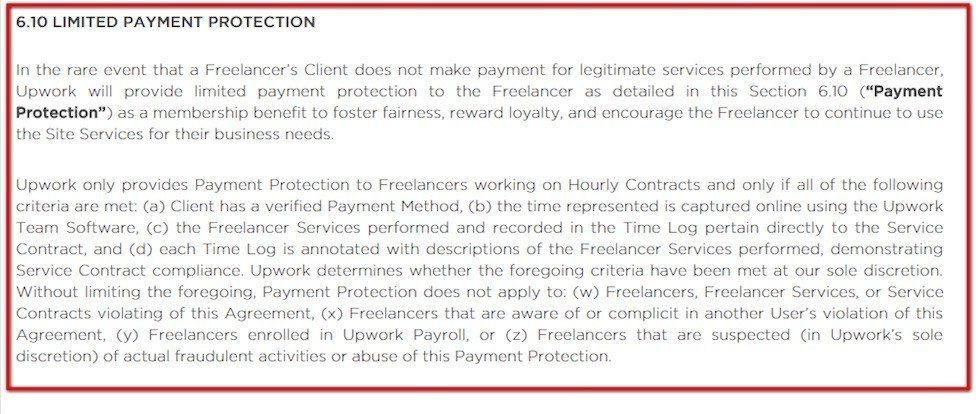
However, UpWork also references this section in other agreements, such as in the "UpWork Hourly Payment Protection Section" of the Contractor Policies agreement.

This multiple breakdown of sections helps add clarity for users when looking for specific information, however it can still make things seem a bit overly complicated by giving users a dozen different policies to consider.
Fiverr
Fiverr is an online marketplace where people can buy and sell creative work, such as writing and photoshop editing, voiceovers and graphic design work for $5 a pop.
Because of this more simple, limited concept, the Terms of Service of Fiverr are also rather simple. They're broken down mainly into a "Buyers" and "Sellers" section.
See the beginning of the "Sellers" section below:
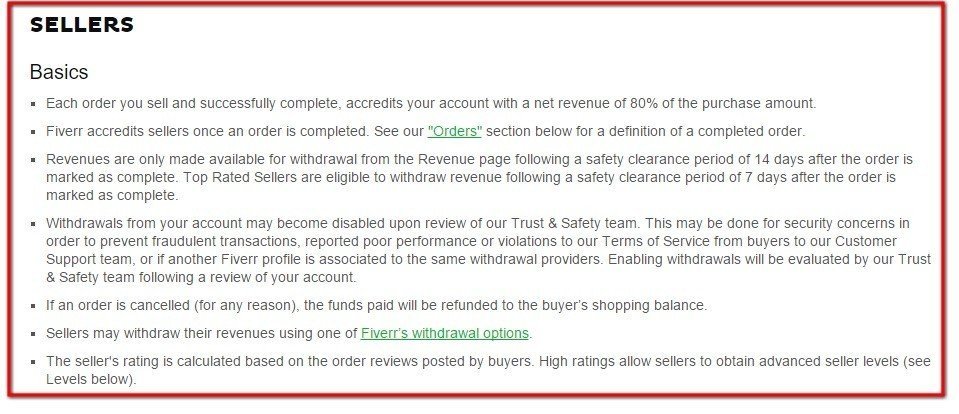
Fiverr's legal agreement includes sections such as "User Conduct", "Disclaimer of Warranties", and "Limitation of Liability", sections where information about how users are expected to act, and the limitation of responsibilities of Fiverr are covered. These sections are very useful to include.
Because Fiverr is acting as a conduit for users both in a buying and selling capacity, as well as providing a service of its own to these users, Fiverr needs to maintain control over how these users interact with its service and what risks are taken on by Fiverr:
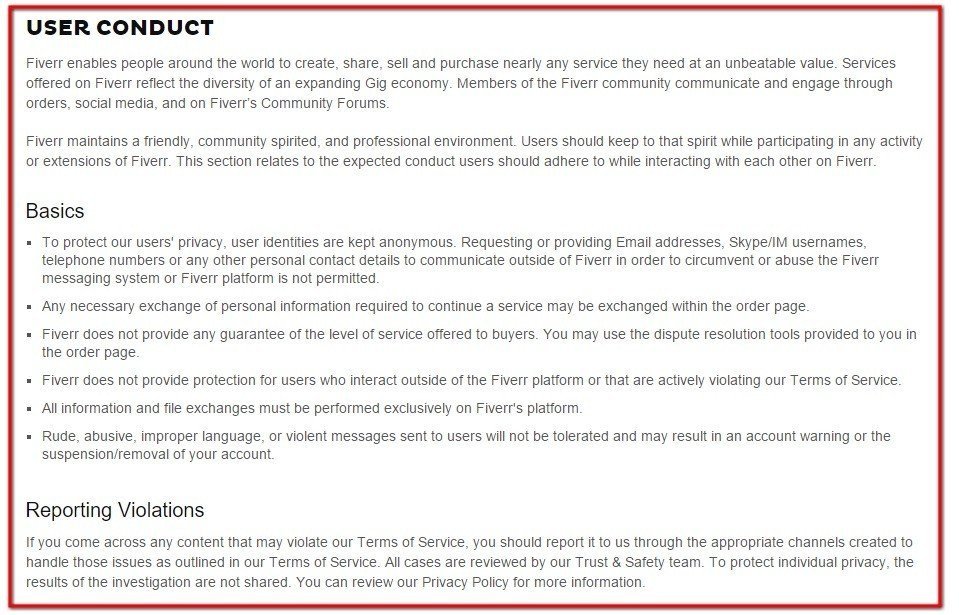
And here is Fiverr's "Disclaimer of Warranties" and its "Limitation of Liability":
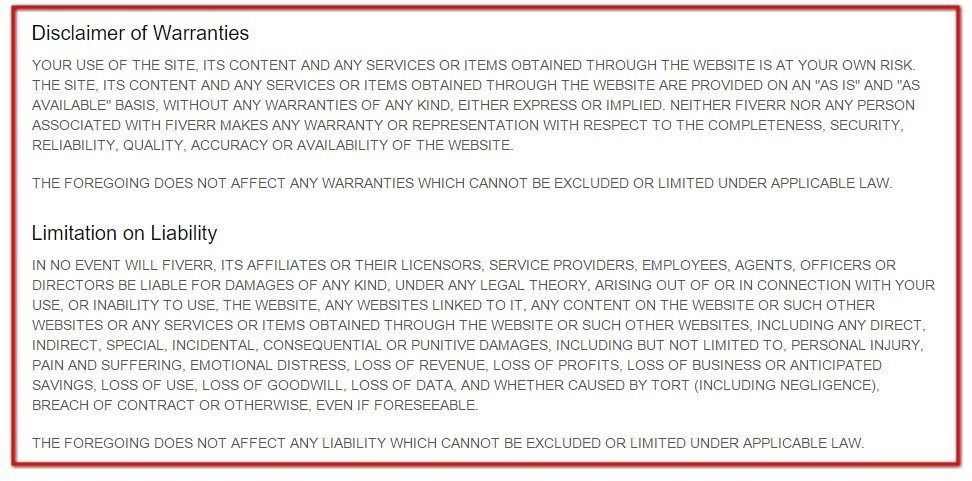
Envato Market
The Envato Market is, according to Envato Market, a site of "platforms that allow members to buy and sell licenses to use digital items like website themes, production music, motion graphics project files, software code, vectors, images and much, much more."
Because Envato Market allows people to buy and sell licenses rather than products or services, the legal agreements for this online marketplace look a little different than those for the previously-mentioned marketplaces.
Envato Market has a general Terms policy, as well as Author Terms page that people who create the digital items must follow. (Author Terms are comparable to Freelancer Terms in marketplaces like UpWork.)
There's also an Envato API Service Terms and Conditions page that is very unique to marketplaces that deal with programming:
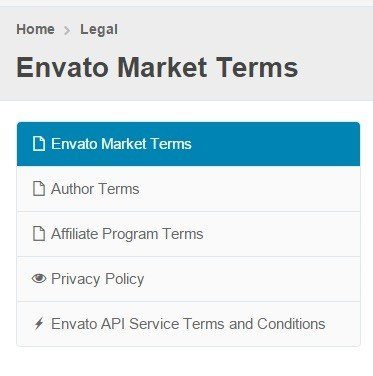
API stands for Application Programming Interface, which is basically an interface provided to programmers that lets them build and manipulate software applications. Envato provides an API, or a platform for programmers to use, on their website, but requires users to register and agree to terms before being allowed to use the API.
You can use a Terms and Conditions for your API as well.
The Envato API Service Terms and Conditions includes sections such as "Use of Envato Brand" where rights and limitations of using the Envato brand in programming created with the API are spelled out.
There's also a section on what users must do and can't do when using the API:
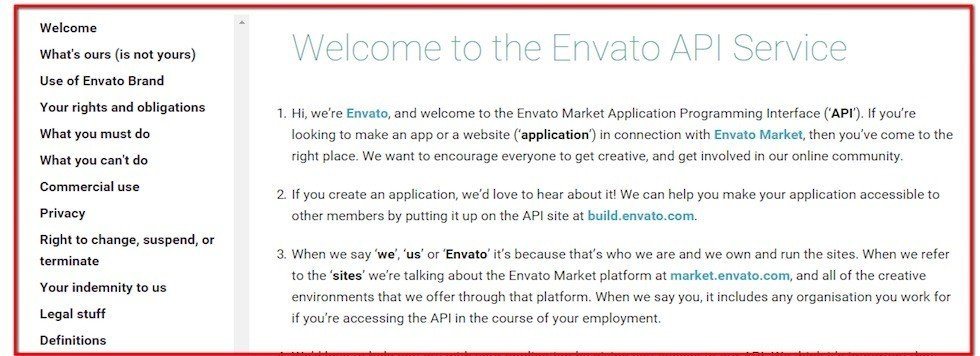
The Envato Market Terms are found linked in the footer of each of the different components of Envato Market, such as Code Canyon, Audio Jungle, Video Hive, etc. so that each component of the market is clearly covered by the same Envato Terms.

Creative Market
Creative Market, which deals with licensing creative mediums such as fonts and graphics creation, takes a unique approach with how it shares important information with users.
There's a general Terms of Use page that includes all standard and relevant information, such as rules of using the service and issues of privacy, payments, and arbitration, as well as a License Terms policy page that deals solely with licensing issues.
Along with this License Terms policy is a very helpful License FAQ that helps break down and explain all of the details of licensing issues that are described in the "License Terms" policy.
This addition of an FAQ is a great way to have a legally binding policy with all the required legal information and disclaimers, but also provide a quick and convenient way for users to really understand what they're agreeing to, and what they can and cannot do with the licenses granted through Creative Market.
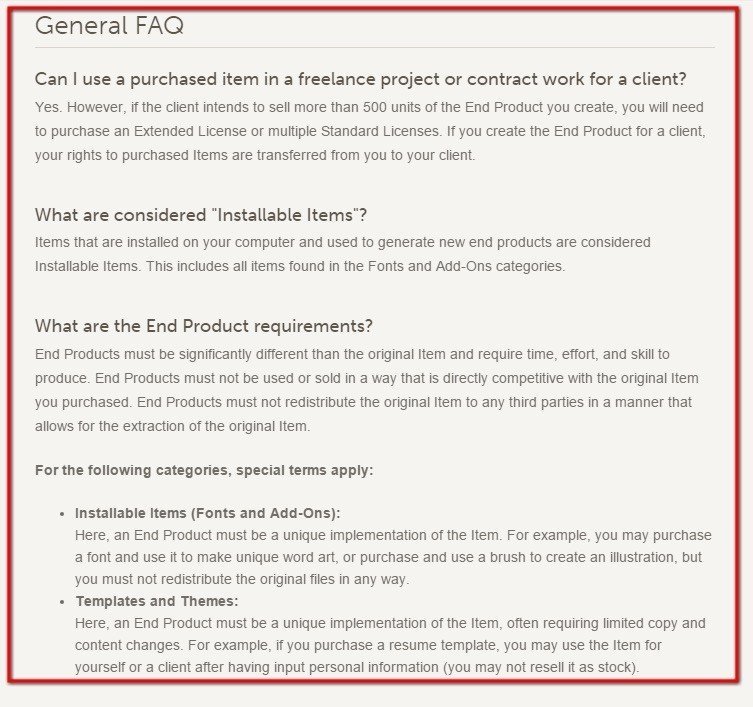
Udemy
Udemy is a marketplace for online teachers and students. People can sign up as teachers to teach classes, and others can enroll as their students.
Accordingly, the Terms of Use of Udemy has sections specific to the obligations of both students and teachers, or instructors, who use the site.
Here is Udemy's "Specific Obligations of Instructors":
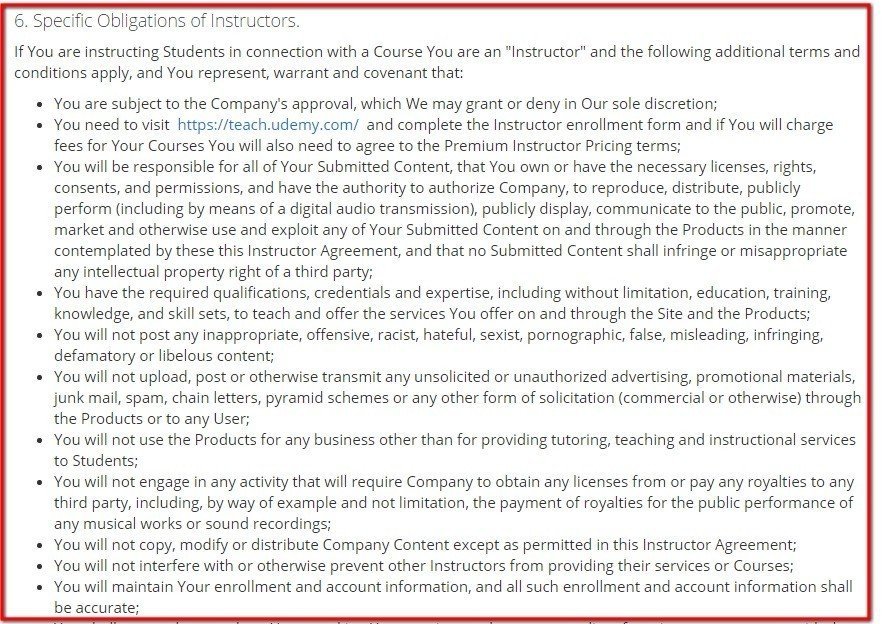
And here is Udemy's "Specific Obligations of Students using the Site":
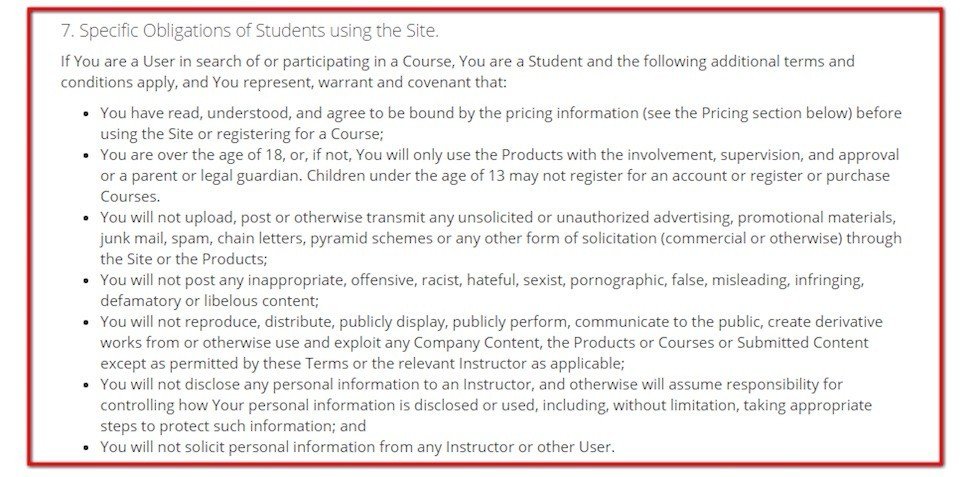
Other clauses are fairly standard, such as general disclaimers, limitations of warranties, and terms of payments and refunds. Because the instructors and students are the main "goods" in this marketplace, the bulk of the legal agreements here deal with the conduct, expectations, and limitations placed on the instructors and students.
While all online marketplaces will have general legal agreements such as Terms of Use and Privacy Policies, some marketplaces will also have more specific or specialized legal agreements unique to them or their industry, such as the API Agreement at Envato, or the Freelancer Membership Policy at Upwork.
Even within the general, commonly found legal agreements across different marketplaces, there will oftentimes be different clauses from one industry to another.
For example, consider a clause that deals with licenses and license transfers, or one that deals with the actions of instructors on a marketplace that sells educational lessons. While some clauses will always be standard, such as a disclaimer of warranties or a limitation of liability, there's room to customize legal agreements for the specific needs and business model or format of your marketplace, both through additional clauses and fully separate policies.